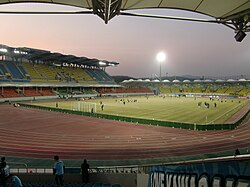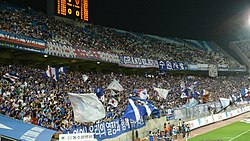 | |
| Season | 2014 |
|---|---|
| Dates | 8 March – 30 November 2014 |
| Champions | Jeonbuk Hyundai Motors (3rd title) |
| Relegated | Gyeongnam FC Sangju Sangmu |
| Champions League | Jeonbuk Hyundai Motors Seongnam FC Suwon Samsung Bluewings FC Seoul |
| Matches played | 228 |
| Goals scored | 503 (2.21 per match) |
| Best Player | Lee Dong-gook |
| Top goalscorer | Júnior Santos (14 goals) |
| Biggest home win | Jeonbuk 6–0 Sangju (20 July 2014) |
| Biggest away win | Gyeongnam 1–4 Jeonbuk (13 July 2014) |
| Highest scoring | Jeju 6–2 Jeonnam (6 September 2014) |
| Longest winning run | 9 matches Jeonbuk Hyundai Motors |
| Longest unbeaten run | 15 matches Jeonbuk Hyundai Motors |
| Longest winless run | 16 matches Gyeongnam FC |
| Longest losing run | 4 matches Gyeongnam FC Jeonnam Dragons |
| Highest attendance | 46,549 Seoul 2–0 Suwon (12 July 2014) |
| Lowest attendance | 858 Jeonnam 1–1 Seongnam (1 November 2014) |
| Average attendance | 7,932 |
← 2013 2015 → | |
The 2014 K League Classic was the 32nd season of the top division of South Korean professional football, and the second season of the K League Classic.
Contents
- Teams
- General information
- Stadiums
- Managerial changes
- Foreign players
- League table
- Positions by matchday
- Round 1–33
- Round 34–38
- Results
- Matches 1–22
- Matches 23–33
- Matches 34–38
- Relegation play-offs
- Player statistics
- Top scorers
- Top assist providers
- Awards
- Main awards
- Best XI
- Attendance
- Attendance by club
- Top matches
- See also
- References
- External links












